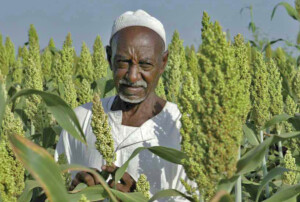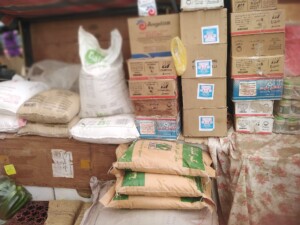Sudanese farmers protest delayed funding for current agricultural season
Farmers in South Kordofan and Sennar staged protests in front of the Sudanese Agricultural Bank branches. They are angry that their already-limited funding is delayed at a time when Sudanese farmers face significant challenges and the agricultural season is at risk of failing.
 Farmers protesting in front of the Sudanese Agricultural Bank in El Mazmoum warn of the failure of the agricultural season because of the delays in funding (social media)
Farmers protesting in front of the Sudanese Agricultural Bank in El Mazmoum warn of the failure of the agricultural season because of the delays in funding (social media)
Farmers in South Kordofan and Sennar staged protests in front of the Sudanese Agricultural Bank branches. They are angry that their already-limited funding is delayed at a time when Sudanese farmers face significant challenges and the agricultural season is at risk of failing.
Farmers in Ed Dali in Sennar organised a protest vigil in front of the office of the Sudanese Agricultural Bank in El Mazmoum on Sunday to denounce the bank's nearly two-month-long delay in transferring their financial support. The lack of financial support threatens, and might lead to the failure of, the agricultural season in the region.
Last week, Radio Dabanga reported that financial struggles form the biggest challenge facing this agricultural season, with high inflation and the related shortages and high prices of fuel, electricity, fertilisers, and pesticides.
Farmers in South Kordofan also held a sit-in in front of the Sudanese Agricultural Bank in Delling last week Sunday to protest the delay in financing and the compulsory insurance policy, which not all farmers can afford.
The general lack of funding and the delay of payments of financial support has angered the farmers.
They are in serious need of funding, especially because the agricultural season last year failed as well. They attributed the failure to the lack of rain and the insecurity in the region as many farmers were attacked on their farms last year.
The bank’s management responded to their demands and announced last Wednesday that cash financing would also be granted to farmers who do not have agricultural insurance.
Yet, those farmers who completed the financing procedures of the bank and received official approval for funding entitlement did not receive the full amount.
Opinions
Farmers in Delling, South Kordofan, explained that they are dissatisfied with the financing policy for this agricultural season.
Dabanga Sudan correspondent Abdelrahim Markazo Kunda asked various farmers visiting the Sudanese Agricultural Bank branch in Delling who, in their opinion, is responsible for the failure of the current agricultural season.
'The failure of the current agricultural season is a joint responsibility, the problem of the delay in financing is the responsibility of the state but some of the farmers are not ready as well'
Opinions were diverse. “The failure of the current agricultural season is a joint responsibility, the problem of the delay in financing is the responsibility of the state but some of the farmers are not ready as well”, a farmer from Habila responded.
According to a farmer from Kartala “the state is failing” its duties. Another farmer, from the area of El Baraka, replied that: “the owners of carts wearing jalabiyas [traditional dress, i.e. the poor] are trying to gather some of the bank’s pennies”.

Serious concerns
In early June, at the beginning of the rain-fed agricultural season, farmers in El Gezira expressed serious concerns about their ability to start cultivating during the June-to-September main rainfall season this year.
Especially lack of state financial support seems to be a problem. Last week, Radio Dabanga reported that funded farming in eastern Sudan ‘decreased by half’ this year.
In the past years, farmers were forced to take loans from the Sudanese Agricultural Bank to prepare for the winter season because the bank's financing of production inputs stopped five years ago, and they have not received any other state support. He expressed his fear that “if the situation continues in this way, there will be no cultivation anymore in El Gezira”.
'If the situation continues in this way, there will be no cultivation anymore in El Gezira'
Economic crisis
Sudan is in a deep economic crisis. Lack of foreign investments and support after the October 25 military coup, rising inflation, and global supply chain problems, such as limited grain exports from war-torn Ukraine, have led to severe financial problems in the country.
Droughts, floods, and lack of financial support for farmers further put Sudan’s food security at risk. United Nations indicated that 17 million Sudanese are at risk of starvation and 70 per cent of them are unable to purchase basic and necessary commodities.
The Sudanese authorities have often been accused of not acting on, and even aggravating, the economic crisis.
In response to the crisis, the Sudanese Minister of Finance and Economic Planning stressed that Sudan is open to, and ready for, “all investments and strategic partnerships with everyone”, but especially Turkish investments.
On Sunday, he met with a delegation of Turkish businessmen, headed by the Turkish Deputy Minister of Industry. Finance Minister Jibril Ibrahim called on the government and Turkish businessmen to invest in various economic sectors, especially agriculture, industry, mining, infrastructure development, education, and health services.
He ordered “the removal of all obstacles facing foreign investments in general, and Turkish investments in particular”.











 and then
and then